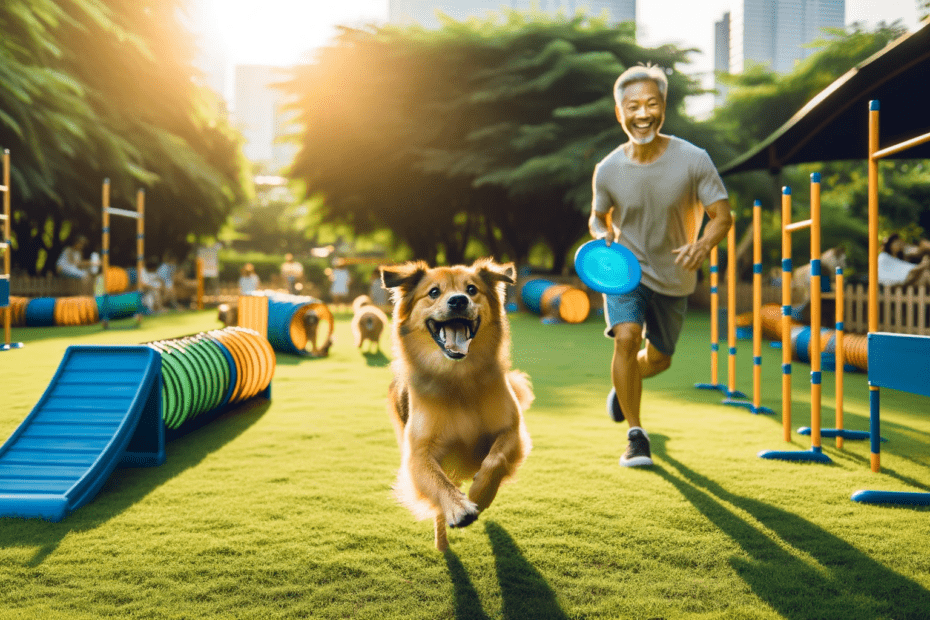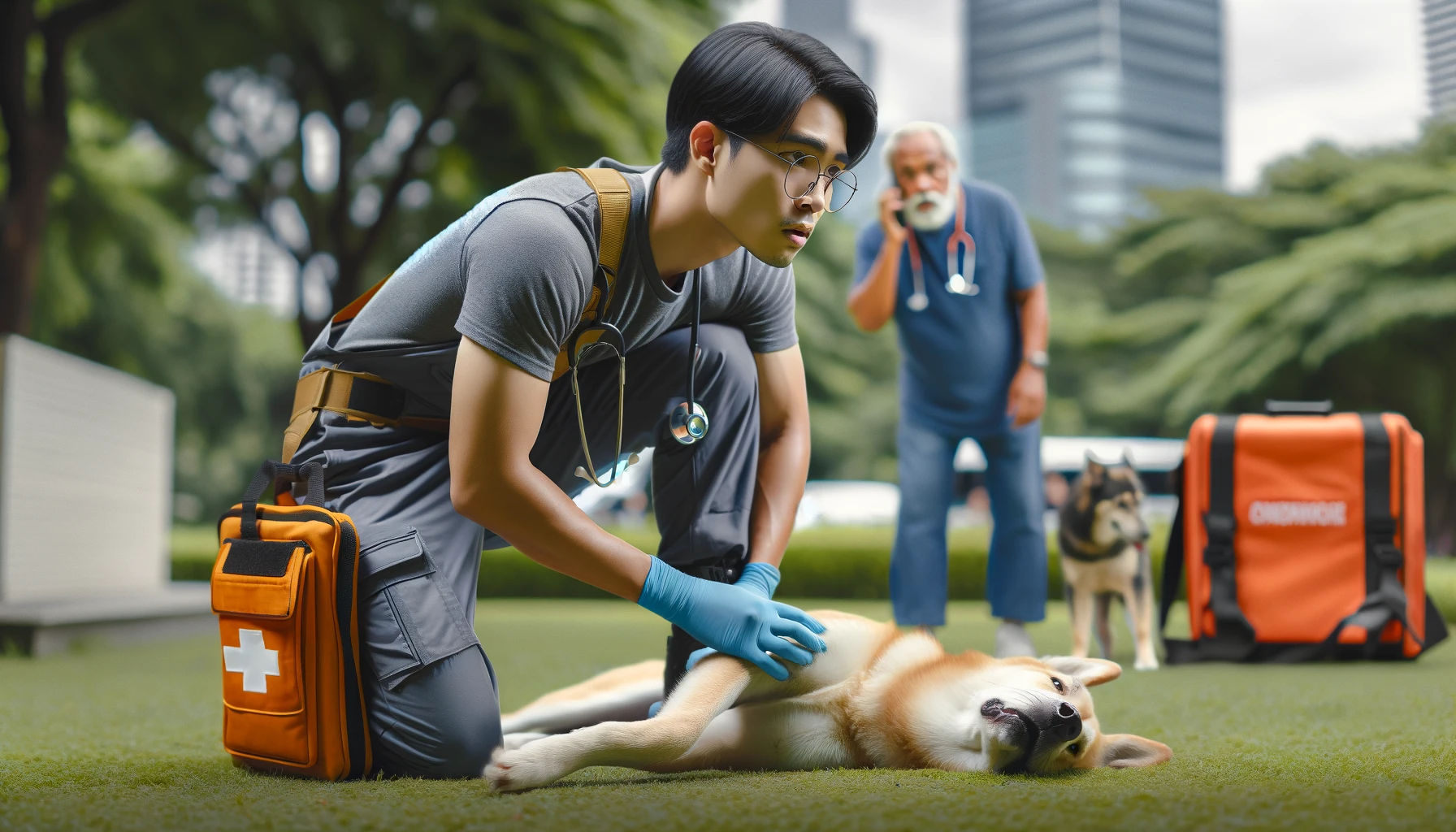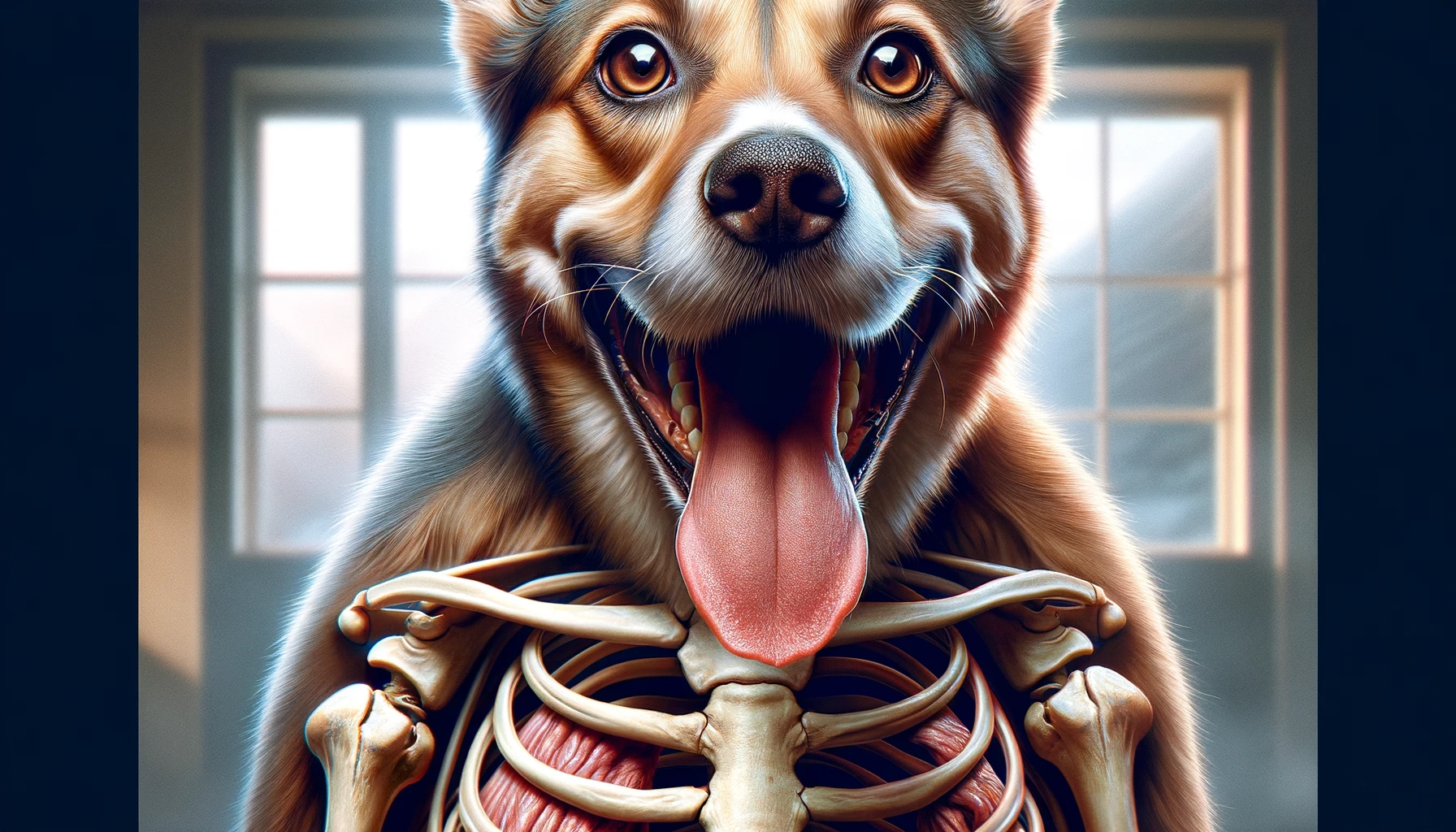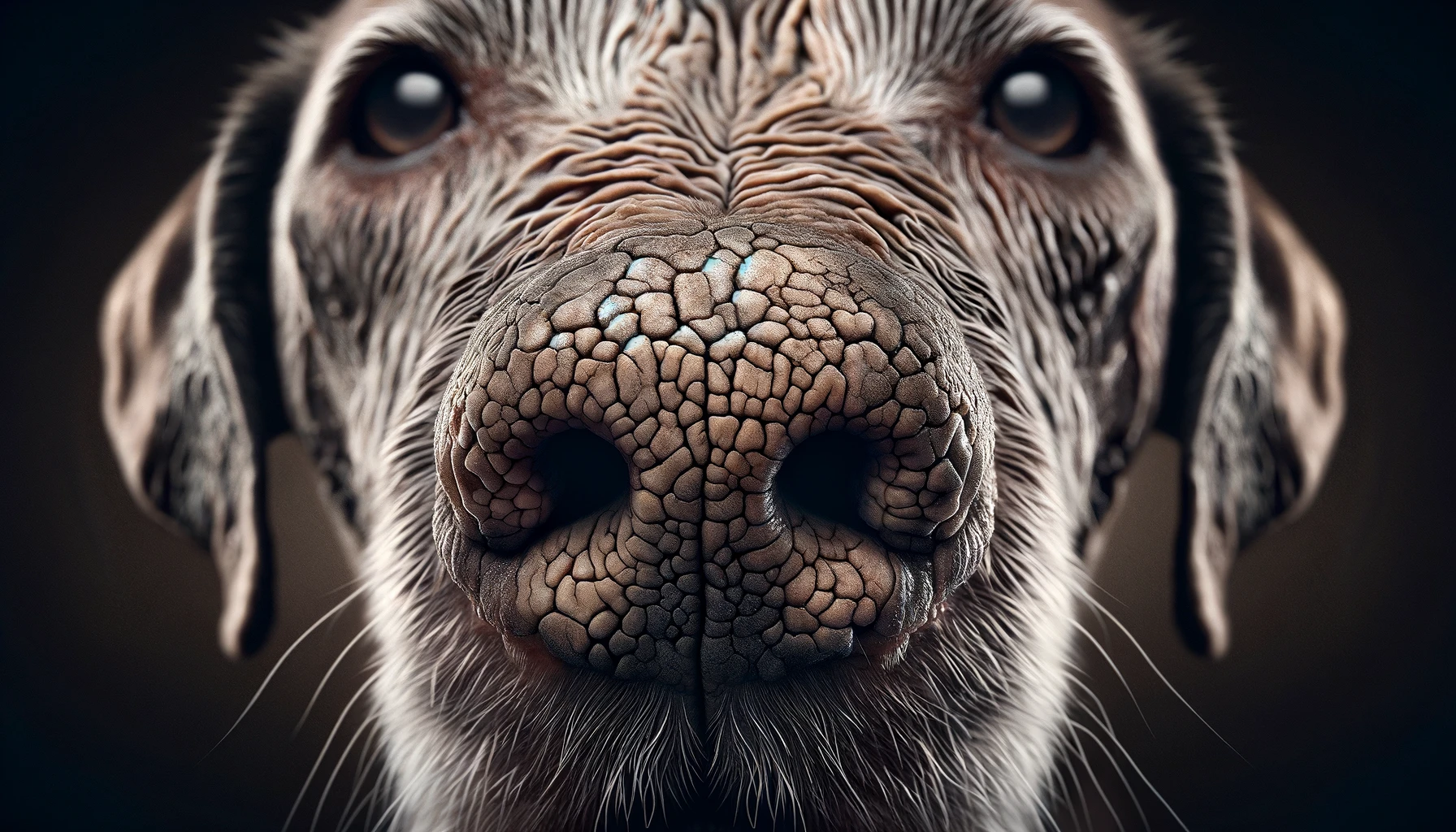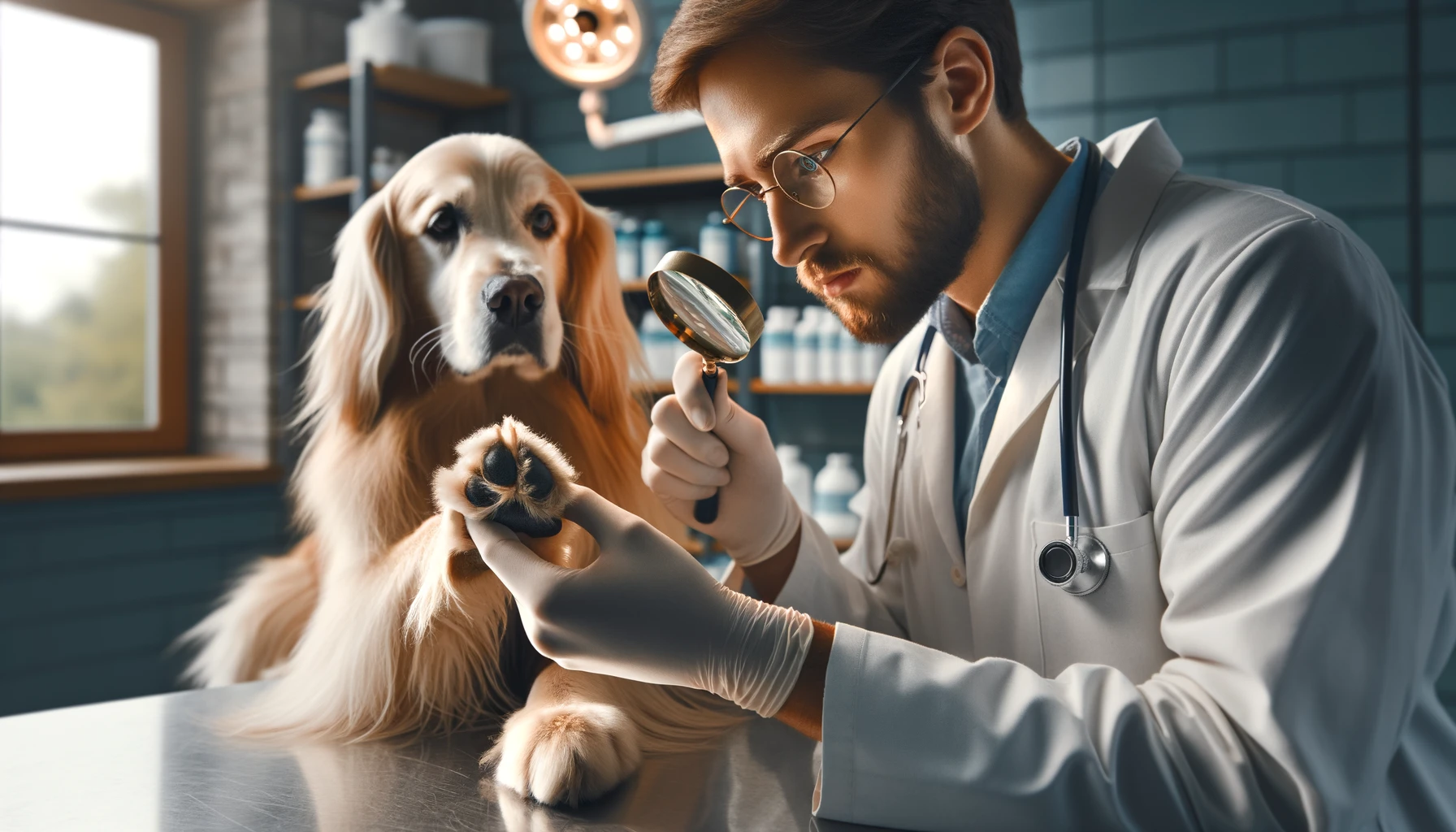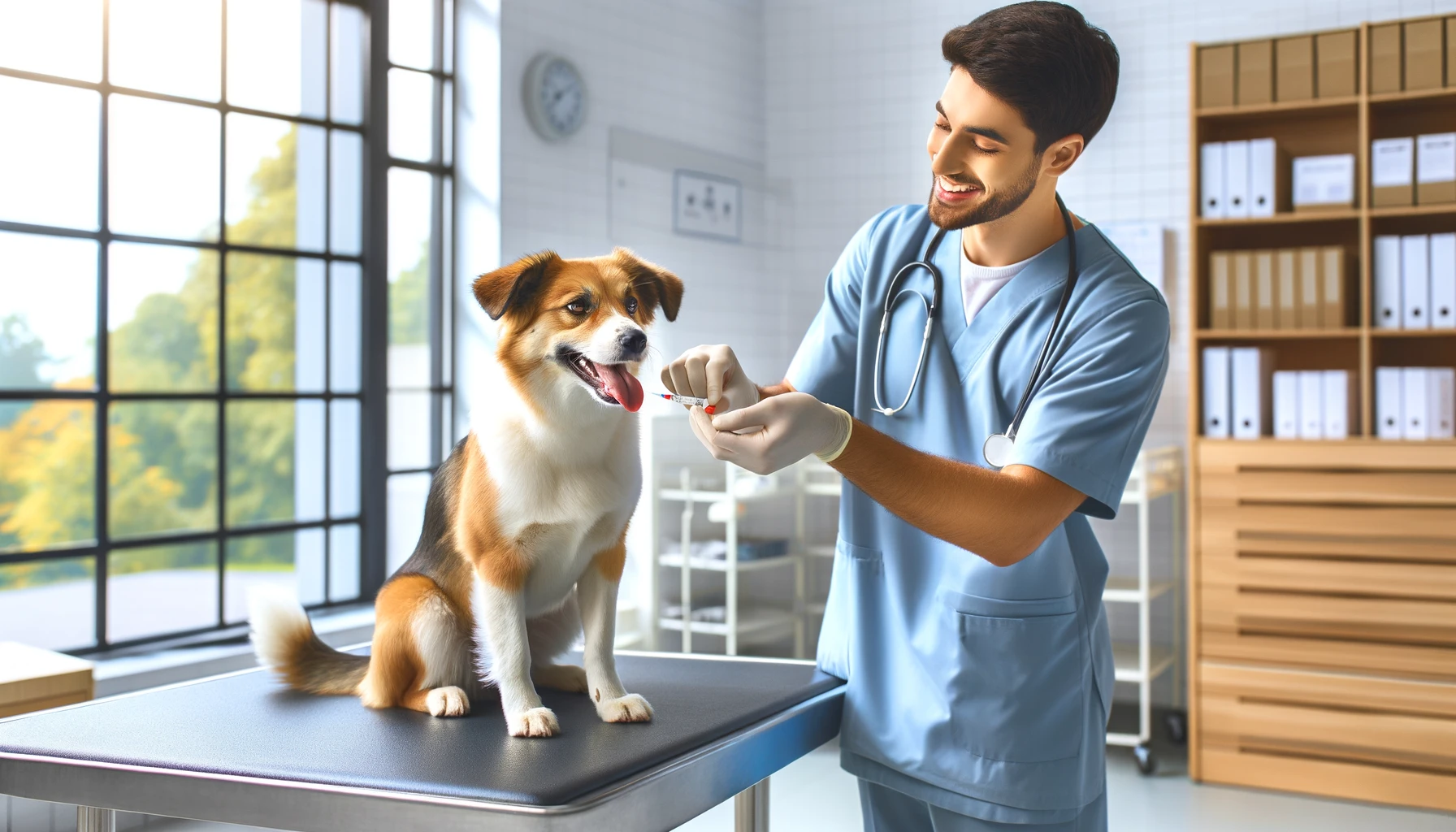Are you looking for ways to keep your furry friend in top shape? Look no further! We've compiled 12 essential tips to help you keep your dog healthy.
From a balanced diet and regular exercise to routine check-ups and dental care, this article covers everything you need to know.
Discover how to provide a safe and clean environment, manage stress, and ensure proper socialization and training.
Your dog's well-being is in your hands, so let's get started!
Key Takeaways
- Provide a balanced diet with proteins, carbohydrates, fats, vitamins, and minerals.
- Regular exercise helps maintain a healthy weight and provides mental stimulation.
- Regular check-ups prevent diseases and identify health issues early.
- Regular brushing with dog-specific toothbrush and toothpaste.
Balanced Diet
To keep your dog healthy, it's important to provide them with a balanced diet. Balanced nutrition is crucial for your dog's overall well-being and longevity. Just like humans, dogs require a combination of proteins, carbohydrates, fats, vitamins, and minerals to support their daily activities and maintain optimal health.
When it comes to feeding your dog, portion control is key. It's crucial to feed your dog the right amount of food to prevent obesity or malnutrition. Each dog is unique, so it's essential to consult with your veterinarian to determine the appropriate portion size based on your dog's age, weight, breed, and activity level.
In addition to portion control, it's important to choose high-quality dog food that meets your dog's nutritional needs. Look for dog food brands that have been formulated by veterinarians and meet the standards set by regulatory bodies. Read the labels carefully to ensure that the food contains a balanced blend of proteins, carbohydrates, fats, vitamins, and minerals.
Regular Exercise
Regular exercise is essential for keeping your dog healthy. Not only does physical activity help maintain a healthy weight, but it also provides mental stimulation. Dogs need regular exercise to keep their bodies and minds active.
Importance of Physical Activity
Make sure you keep your dog active and moving to maintain their overall health and well-being. Regular exercise is crucial for dogs as it provides a range of benefits and contributes to their overall physical and mental health.
Playtime isn't just a fun activity for dogs; it's an essential part of their routine. Engaging in regular exercise helps to prevent obesity, keeps their muscles strong, and improves cardiovascular health. Physical activity also helps to stimulate their minds, alleviate boredom, and reduce destructive behaviors.
Whether it's a game of fetch, a walk, or a run in the park, make sure your dog gets enough exercise every day. Remember, a tired dog is a happy and healthy dog!
Exercise for Mental Stimulation
Engage your dog in regular exercise to provide them with mental stimulation. Regular exercise not only keeps your dog physically fit but also helps keep their mind sharp and active.
Here are some mental stimulation ideas to incorporate into your dog's exercise routine:
- Puzzle toys: These interactive toys challenge your dog's problem-solving skills and keep them mentally engaged.
- Hide and seek: Hide treats or toys around the house or in the yard for your dog to find. This game stimulates their senses and encourages them to use their nose to locate the hidden items.
- Training sessions: Teach your dog new tricks or reinforce basic obedience commands. Training sessions not only provide mental stimulation but also strengthen the bond between you and your furry friend.
- Food-dispensing toys: These toys require your dog to work for their food. They provide mental stimulation as your dog figures out how to access the treats or kibble.
- Interactive playtime: Engage in interactive games like fetch or tug-of-war. These activities keep your dog mentally stimulated while also providing physical exercise.
Incorporating these mental stimulation ideas and using interactive toys will help keep your dog's mind sharp and prevent boredom.
Remember to always supervise your dog during playtime and choose toys that are suitable for their size and breed.
Proper Hydration
Ensure your dog's hydration by providing ample access to clean and fresh water throughout the day. Proper hydration is essential for your dog's overall health and well-being. Just like humans, dogs need to stay hydrated to maintain proper bodily functions and prevent dehydration. Dehydration can lead to serious health issues and even be life-threatening for your furry friend.
To ensure your dog stays properly hydrated, always make sure they have access to clean and fresh water. Keep their water bowl filled throughout the day and check it regularly to ensure it hasn't run dry. Dogs have different water needs depending on their size, age, and activity level, so it's important to be mindful of their individual requirements.
In addition to providing water, you can also incorporate moisture-rich foods into your dog's diet. Wet dog food or adding water to their dry kibble can help increase their water intake. This is especially important during hot weather or after rigorous exercise when dogs tend to lose more water through panting.
It's crucial to recognize the signs of dehydration in dogs, which include excessive panting, dry gums, loss of skin elasticity, lethargy, and sunken eyes. If you suspect your dog is dehydrated, contact your veterinarian immediately for guidance.
Routine Veterinary Check-ups
Regular veterinary check-ups are an important part of maintaining your dog's health and well-being. These routine visits to the vet not only help prevent diseases but also ensure that any potential health issues are identified and treated early on. Here are some reasons why preventive care through veterinary check-ups is crucial for your furry friend:
- Vaccinations: Regular check-ups allow your vet to administer necessary vaccinations to protect your dog against various diseases such as rabies, distemper, and parvovirus.
- Parasite Control: Your vet can provide preventive treatments for fleas, ticks, and heartworms during these visits, ensuring your dog stays protected against these harmful parasites.
- Dental Care: Regular check-ups allow your vet to assess your dog's dental health and recommend appropriate dental care, including cleanings and treatments for gum disease or tooth decay.
- Nutrition and Weight Management: Your vet can provide guidance on your dog's diet, ensuring they receive the right nutrients and maintaining a healthy weight, which is crucial for preventing obesity-related health issues.
- Early Detection of Health Problems: Routine check-ups provide an opportunity for your vet to conduct thorough physical examinations and screenings, helping detect any underlying health problems before they become serious.
Dental Care
How can you actively maintain your dog's dental health?
Canine oral hygiene is an essential aspect of your pet's overall well-being. Preventing dental disease in dogs is crucial for their comfort and longevity. To ensure your dog's dental health, there are a few key practices you should implement.
Firstly, regular brushing is crucial. Use a dog-specific toothbrush and toothpaste to clean your pet's teeth at least two to three times a week. This will help remove plaque and tartar buildup, reducing the risk of dental disease.
Additionally, providing dental treats and toys can aid in maintaining your dog's oral health. Chew toys, specifically designed to promote dental hygiene, can help remove plaque and tartar, while also satisfying your dog's natural urge to chew.
Incorporating a dental diet into your dog's meal plan can also be beneficial. These specialized diets contain ingredients that help reduce plaque and tartar buildup, promoting healthier teeth and gums.
Finally, scheduling regular dental check-ups with your veterinarian is essential. They can perform professional teeth cleaning and address any potential dental issues before they become more severe.
Vaccinations and Preventive Medications
To effectively protect your dog from preventable diseases, it's important to ensure that they receive regular vaccinations and preventive medications. Here are some key preventive measures to keep in mind for your dog's health:
- Vaccine schedule: Consult with your veterinarian to establish a vaccine schedule tailored to your dog's specific needs. Vaccines are crucial in protecting your dog against diseases such as rabies, parvovirus, distemper, and more.
- Core vaccines: Make sure your dog receives core vaccines, which are essential for their overall health. These vaccines protect against highly contagious and potentially fatal diseases.
- Non-core vaccines: Depending on your dog's lifestyle and geographic location, non-core vaccines may be recommended. These vaccines target diseases that are less common but still pose a risk.
- Preventive medications: In addition to vaccines, your dog may require preventive medications to protect against parasites such as fleas, ticks, heartworms, and intestinal worms. Regular use of these medications can help keep your dog healthy and free from infestations.
- Regular check-ups: Schedule regular veterinary check-ups to ensure your dog's vaccinations and preventive medications are up to date. These check-ups also allow your vet to monitor your dog's overall health and address any concerns promptly.
Grooming and Skin Care
To maintain your dog's overall health and prevent skin issues, it's crucial to prioritize grooming and skin care.
Regular dog grooming not only keeps your furry friend looking their best but also plays a vital role in maintaining their skin health. Proper grooming helps remove dirt, debris, and dead hair from your dog's coat, preventing matting and reducing the risk of skin infections. It also allows you to closely examine your dog's skin for any abnormalities such as dryness, redness, or sores, which can be early signs of underlying health issues.
Additionally, regular brushing promotes healthy hair growth and distributes natural oils, keeping the skin moisturized and preventing dryness and itchiness. When bathing your dog, use a mild shampoo specifically formulated for dogs to avoid stripping their skin of essential oils. After bathing, make sure to thoroughly dry your dog's coat to prevent moisture buildup, which can lead to fungal or bacterial infections.
Lastly, don't forget to regularly check and clean your dog's ears and trim their nails to complete their grooming routine.
Mental Stimulation
To keep your dog healthy, it's important to provide regular mental stimulation. Just like humans, dogs need cognitive enrichment to keep their minds sharp and prevent boredom. Here are some ways you can provide mental stimulation for your furry friend:
- Puzzle toys: Invest in interactive toys that require your dog to solve puzzles to get treats or rewards. This engages their problem-solving skills and keeps them mentally active.
- Training sessions: Regular training sessions not only help improve your dog's obedience but also provide mental stimulation. Teach them new tricks or reinforce old commands to keep their minds active.
- Scent games: Dogs have an incredible sense of smell, so why not put it to good use? Hide treats or toys around the house or in the yard and let your dog use their nose to find them. This activity stimulates their natural hunting instincts and keeps them mentally engaged.
- Playdates: Social interaction with other dogs can be mentally stimulating for your furry friend. Organize playdates with other friendly dogs to provide socialization opportunities and mental stimulation.
- Rotate toys: Dogs can get bored with the same toys over time. To keep things interesting, rotate their toys every few days. This way, they always have something new and exciting to play with.
Parasite Control
To keep your dog healthy, it's essential to prioritize parasite control.
Preventing flea infestations is crucial, as these pesky insects can cause discomfort and transmit diseases.
Additionally, tick-borne diseases are a serious concern, so make sure to take preventive measures to keep your dog protected.
Preventing Flea Infestations
Keep your dog healthy by regularly using flea prevention methods. Fleas can cause discomfort and health issues for your furry friend, so it's important to take proactive measures to prevent infestations.
Here are some essential tips for flea prevention:
- Use a monthly topical or oral flea treatment recommended by your veterinarian. These products are effective in killing and preventing fleas from infesting your dog.
- Keep your dog's environment clean and free of fleas by regularly vacuuming and washing their bedding.
- Avoid areas with high flea populations, such as tall grass and wooded areas.
- Check your dog regularly for signs of fleas, such as excessive scratching or tiny black dots in their fur.
- Consult with your veterinarian for additional flea prevention measures, such as flea collars or sprays.
Tick-Borne Disease Prevention
Continue protecting your dog's health by taking measures to prevent tick-borne diseases through effective parasite control. Tick prevention is crucial as ticks can transmit various diseases, such as Lyme disease, ehrlichiosis, and anaplasmosis, which can cause serious health issues for your furry friend.
To effectively control ticks, use tick preventives recommended by your veterinarian. These preventives come in various forms, such as spot-on treatments, oral medications, and collars.
Regularly inspect your dog for ticks, especially after walks or outdoor activities. If you find any ticks, promptly remove them using tweezers or a tick removal tool.
Additionally, maintaining a clean and tick-free environment by regularly vacuuming and washing your dog's bedding can help prevent tick infestations.
Safe and Clean Environment
How can you ensure that your dog is living in a safe and clean environment? Here are some essential tips to help you maintain a healthy and hygienic living space for your furry friend:
- Use pet-friendly cleaning products: When cleaning your home, opt for pet-safe cleaning products that are free from harmful chemicals. Some common household cleaners can be toxic to dogs, so it's important to read labels and choose products that are safe for both your pet and the environment.
- Regularly clean your dog's belongings: Your dog's bedding, toys, and food and water bowls can harbor bacteria and dirt. Make sure to regularly clean and disinfect these items to prevent the spread of germs and ensure a safe and clean environment for your dog.
- Create a designated potty area: Establishing a specific spot in your yard for your dog to relieve itself can help maintain cleanliness in your outdoor space. Regularly clean up waste to prevent odors and the spread of diseases.
- Ensure outdoor safety: Keep your dog safe when spending time outdoors by checking your yard for any potential hazards, such as toxic plants, chemicals, or small objects that your dog could swallow. Also, make sure your fencing is secure to prevent your dog from escaping.
- Regularly groom your dog: Regular grooming not only keeps your dog looking and smelling good, but it also helps to maintain their overall cleanliness and health. Regular brushing, bathing, and nail trimming are essential for a clean and comfortable dog.
Stress Management
When it comes to managing stress in your dog, there are a few key points to keep in mind.
First, regular exercise is essential for stress relief. Engaging your dog in physical activity helps them release pent-up energy and promotes relaxation.
Additionally, employing calming techniques, such as massage or aromatherapy, can help soothe your dog's nerves.
Exercise for Stress Relief
To promote stress relief in your dog, engage in regular exercise routines that are tailored to their specific needs. Exercise not only helps in weight loss but also improves cardiovascular health in dogs.
Here are some essential tips for incorporating exercise into your dog's routine:
- Choose the right type of exercise: Consider your dog's breed, age, and overall health to determine the most suitable activities. Options include walking, running, swimming, or playing fetch.
- Maintain a consistent schedule: Set aside dedicated time each day for exercise to establish a routine that your dog can rely on.
- Mix up the activities: Variety in exercise helps keep your dog engaged and motivated. Alternate between different activities to prevent boredom.
- Gradually increase intensity: Start with low-intensity exercises and gradually increase the duration and intensity to avoid overexertion or injury.
- Monitor your dog's response: Pay attention to your dog's energy levels, breathing, and overall behavior during and after exercise. Adjust the routine as needed to ensure it's beneficial and not causing any undue stress.
Calming Techniques for Dogs
To help your dog manage stress, try implementing calming techniques such as using a subordinating conjunction in a sentence.
Calming techniques can be highly effective in reducing anxiety and promoting relaxation in dogs. One technique is known as 'the settle.' This involves teaching your dog to relax on a mat or in a designated area. Start by rewarding your dog for lying down and staying calm. Gradually increase the duration of time your dog stays in the settled position.
Another technique is deep pressure therapy, which involves applying gentle pressure to certain parts of your dog's body using a weighted blanket or a specialized vest. This can help alleviate anxiety and promote a sense of security.
Additionally, incorporating mental stimulation and regular exercise into your dog's routine can also help reduce stress levels.
Creating a Peaceful Environment
By implementing calming techniques and creating a peaceful environment, you can effectively manage stress in your dog. Here are some tips for creating a calming atmosphere and promoting relaxation techniques:
- Provide a comfortable and designated space for your dog to relax, such as a cozy bed or a quiet corner.
- Use soothing music or white noise to create a calming background noise.
- Keep the environment clean and organized to reduce clutter and promote a sense of calm.
- Establish a regular daily routine to provide structure and predictability for your dog.
- Incorporate calming scents, such as lavender or chamomile, through diffusers or sprays to promote relaxation.
Socialization and Training
When it comes to keeping your dog healthy, it's important that you prioritize socialization and training. Socialization benefits your dog by helping them develop good behavior and interact positively with other dogs and people. It prevents fear and aggression issues in the future.
Training techniques play a crucial role in teaching your dog basic commands and manners. Positive reinforcement, such as treats and praise, is a highly effective method for training. It encourages your dog to repeat desirable behaviors. Consistency is key when training your dog. Set clear rules and boundaries and stick to them.
Regular training sessions, even just a few minutes a day, can make a big difference. Remember to be patient and understanding with your dog. Each dog learns at their own pace, so it's important to remain consistent and persistent.
Socialization and training go hand in hand in ensuring your dog's overall well-being. By providing your dog with proper socialization and training, you're setting them up for a healthy and happy life.
Frequently Asked Questions
How Often Should I Bathe My Dog?
You should consider factors like your dog's breed, activity level, and coat type when determining how often to bathe them. Regular dog grooming, including bathing, helps maintain their cleanliness and overall health.
What Are Some Signs That My Dog May Be Stressed?
If your dog seems stressed, watch for signs like excessive panting, restlessness, or aggression. To calm them down, try providing a quiet space, engaging in calming activities, or using products like pheromone diffusers.
How Do I Prevent My Dog From Getting Fleas and Ticks?
To prevent fleas and ticks on your dog, take preventive measures like using flea and tick prevention products, regularly grooming your dog, and keeping their living area clean. Natural remedies like essential oils can also be effective.
Can I Give My Dog Human Food as a Treat?
Yes, you can give your dog human food as a treat, but be cautious. Some dog-friendly treat options include fruits and vegetables. However, certain human foods can be toxic to dogs, so it's important to avoid those to keep your dog healthy.
How Can I Help My Dog Stay Mentally Stimulated?
To help your dog stay mentally stimulated, consider using dog puzzle toys and interactive play ideas. These activities can provide mental challenges and keep your dog engaged and entertained.
Conclusion
In conclusion, by following these essential tips, you can ensure the optimal health and well-being of your furry friend.
- Providing a balanced diet
- Regular exercise
- Proper hydration
- Routine veterinary check-ups
- Dental care
- Parasite control
- A safe and clean environment
- Stress management
- Socialization and training
These are crucial for keeping your dog healthy. Remember, a healthy dog is a happy dog, and investing in their wellness will result in a lifetime of companionship and joy.
